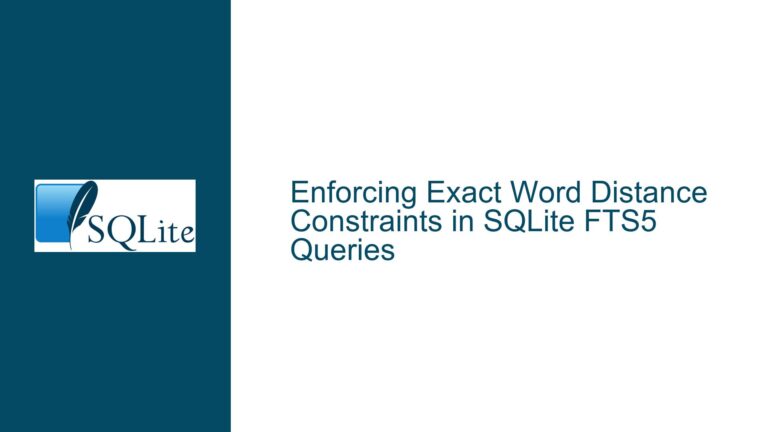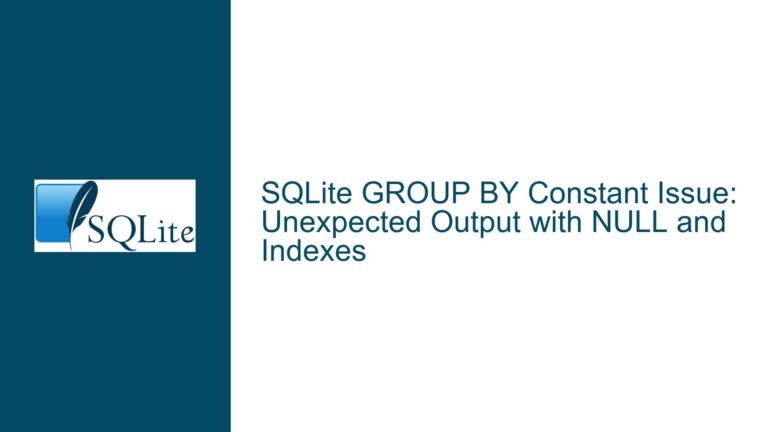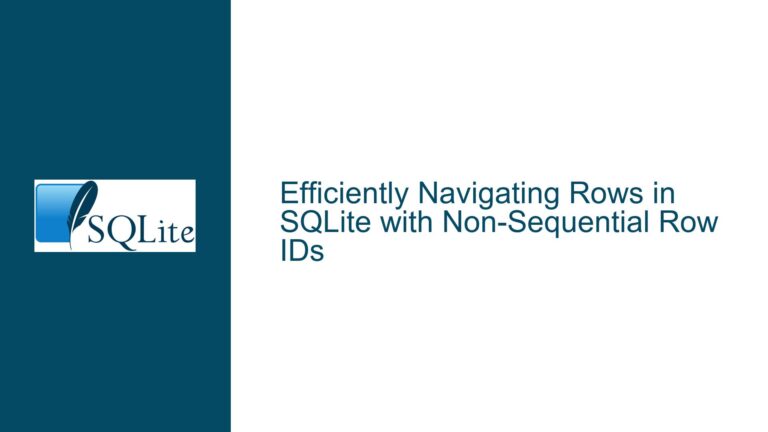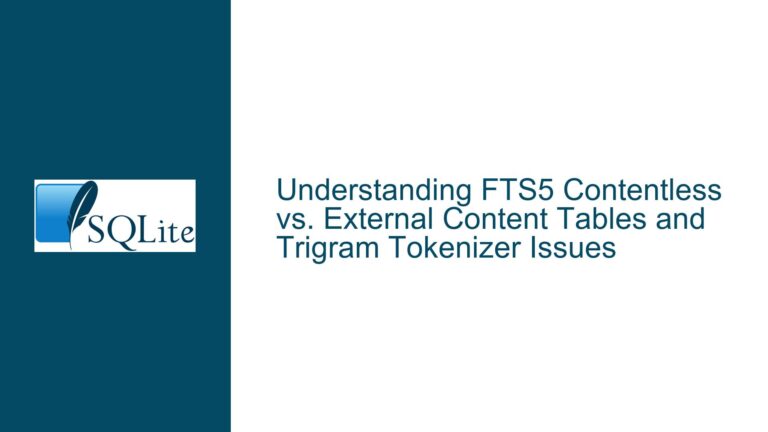Floating-Point Precision Issues in SQLite Queries
Floating-Point Arithmetic and Equality Comparisons in SQLite
Issue Overview
The core issue revolves around the comparison of floating-point numbers in SQLite, specifically when attempting to update a table based on the equality of two floating-point columns. The query in question involves a CREATE TABLE AS SELECT statement followed by an UPDATE statement that sets a column value based on the condition NEW_CREDIT = PPM. However, the equality check fails for some records even though the values appear to be identical when displayed. This discrepancy is a classic symptom of floating-point precision issues, which are inherent in how computers represent and handle real numbers.
Floating-point numbers are represented in a binary format that can introduce small rounding errors. These errors are often negligible in most calculations but become problematic when exact equality is required. In the context of SQLite, this means that two floating-point numbers that appear equal when printed may not be exactly equal in their binary representation, leading to failed equality checks in SQL queries.
The problem is exacerbated when dealing with financial data, where precision is paramount. In the given scenario, the columns NEW_CREDIT and PPM are cast to REAL (SQLite’s floating-point type), which makes them susceptible to these precision issues. The query attempts to set the ESTADO_CONTROL column to ‘OK’ where NEW_CREDIT equals PPM, but due to the inherent imprecision of floating-point arithmetic, this condition fails for some records.
Possible Causes
The primary cause of the issue is the use of floating-point arithmetic and the inherent imprecision of the REAL data type in SQLite. When dealing with floating-point numbers, even a tiny difference in the least significant bits can cause two numbers that appear equal to fail an equality check. This is particularly problematic in SQLite, which does not have a dedicated decimal or fixed-point data type for precise arithmetic.
Another contributing factor is the way the data is being cast and compared. The CAST function is used to convert the NEW_CREDIT and PPM columns to REAL, which introduces floating-point representation errors. Additionally, the ifnull function is used to handle null values in the PPM column, which may also introduce subtle differences in the resulting values.
The issue is further compounded by the fact that the comparison is being made directly in the UPDATE statement. SQLite’s handling of floating-point comparisons is strict, and even the smallest difference will cause the equality check to fail. This strictness is necessary to maintain the integrity of the database, but it can lead to unexpected behavior when dealing with floating-point numbers.
Finally, the lack of awareness or understanding of floating-point arithmetic among developers can also be a contributing factor. Many developers assume that floating-point numbers behave like real numbers in mathematics, leading to confusion when equality checks fail. This misunderstanding can result in poorly designed queries and schemas that are prone to precision issues.
Troubleshooting Steps, Solutions & Fixes
To address the issue, it is essential to understand the nature of floating-point arithmetic and how it affects equality comparisons in SQLite. The following steps and solutions can help mitigate the problem and ensure that the queries behave as expected.
1. Understand Floating-Point Precision:
The first step is to understand the limitations of floating-point arithmetic. Floating-point numbers are represented in a binary format that can introduce small rounding errors. These errors are often negligible in most calculations but become problematic when exact equality is required. Developers should familiarize themselves with the concept of floating-point precision and the potential pitfalls of using floating-point numbers in equality comparisons.
2. Use Decimal or Fixed-Point Arithmetic:
One of the most effective ways to avoid floating-point precision issues is to use decimal or fixed-point arithmetic. SQLite does not have a built-in decimal data type, but it is possible to store numbers as integers and scale them appropriately. For example, instead of storing currency values as REAL, they can be stored as INTEGER representing the number of cents. This approach eliminates the need for floating-point arithmetic and ensures precise comparisons.
3. Implement a Tolerance-Based Comparison:
When dealing with floating-point numbers, it is often necessary to implement a tolerance-based comparison rather than an exact equality check. This involves defining a small tolerance value and considering two numbers equal if their difference is within the tolerance. For example, instead of NEW_CREDIT = PPM, the condition could be ABS(NEW_CREDIT - PPM) < 0.0001. This approach accounts for small differences due to floating-point precision and ensures that the comparison behaves as expected.
4. Avoid Unnecessary Casting:
Unnecessary casting to REAL should be avoided, especially when dealing with financial data. If the data is already in a precise format, such as integers representing cents, casting to REAL can introduce unnecessary precision issues. Instead, the data should be kept in its precise format, and any necessary conversions should be done with care.
5. Use Appropriate Data Types:
Choosing the appropriate data type for the data being stored is crucial. For financial data, it is often better to use INTEGER or TEXT to avoid floating-point precision issues. If floating-point numbers are necessary, it is important to be aware of the potential issues and take steps to mitigate them.
6. Debugging and Verification:
When encountering issues with floating-point comparisons, it is important to debug and verify the values being compared. This can be done by printing the values with high precision or computing the difference between the values. If the difference is non-zero but within an acceptable tolerance, it indicates a floating-point precision issue. This information can be used to adjust the comparison logic accordingly.
7. Schema Design Considerations:
The schema design should take into account the nature of the data being stored and the operations that will be performed on it. For financial data, it is often better to use a schema that avoids floating-point numbers altogether. This can be achieved by storing values as integers representing the smallest unit of currency (e.g., cents) or using a text-based format that preserves precision.
8. Query Optimization:
Queries involving floating-point comparisons should be optimized to minimize the impact of precision issues. This can be achieved by using tolerance-based comparisons, avoiding unnecessary casting, and ensuring that the data is stored in a precise format. Additionally, queries should be tested with a variety of data to ensure that they behave as expected in all scenarios.
9. Education and Best Practices:
Developers should be educated on the nuances of floating-point arithmetic and the best practices for handling floating-point numbers in SQLite. This includes understanding the limitations of floating-point precision, using appropriate data types, and implementing tolerance-based comparisons. By following these best practices, developers can avoid common pitfalls and ensure that their queries and schemas are robust and reliable.
10. Alternative Solutions:
In some cases, it may be necessary to consider alternative solutions to avoid floating-point precision issues altogether. This could involve using a different database system that supports decimal or fixed-point arithmetic, or implementing custom logic to handle precise comparisons. While these solutions may require additional effort, they can provide a more reliable and accurate solution in the long run.
In conclusion, the issue of floating-point precision in SQLite is a common and well-known problem that can lead to unexpected behavior in equality comparisons. By understanding the nature of floating-point arithmetic, using appropriate data types, and implementing tolerance-based comparisons, developers can mitigate these issues and ensure that their queries behave as expected. Additionally, careful schema design and query optimization can further reduce the impact of floating-point precision issues and improve the overall reliability of the database.






